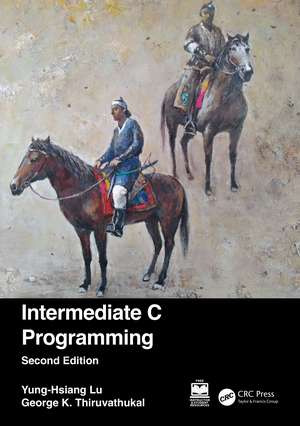Intermediate C Programming
Autor Yung-Hsiang Lu, George K. Thiruvathukalen Limba Engleză Paperback – 6 feb 2024
This second edition provides expanded coverage of these topics with new material focused on software engineering, including version control and unit testing. The text enhances their programming skills by explaining programming concepts and comparing common mistakes with correct programs. It also discusses how to use debuggers and the strategies for debugging as well as studies the connection between programming and discrete mathematics.
Including additional student and instructor resources available online, this book is particularly appealing as a classroom resource.
| Toate formatele și edițiile | Preț | Express |
|---|---|---|
| Paperback (1) | 320.97 lei 3-5 săpt. | +28.85 lei 4-10 zile |
| CRC Press – 6 feb 2024 | 320.97 lei 3-5 săpt. | +28.85 lei 4-10 zile |
| Hardback (1) | 835.91 lei 6-8 săpt. | |
| CRC Press – 6 feb 2024 | 835.91 lei 6-8 săpt. |
Preț: 320.97 lei
Preț vechi: 401.22 lei
-20% Nou
Puncte Express: 481
Preț estimativ în valută:
61.43€ • 63.96$ • 51.91£
61.43€ • 63.96$ • 51.91£
Carte disponibilă
Livrare economică 18 februarie-04 martie
Livrare express 01-07 februarie pentru 38.84 lei
Preluare comenzi: 021 569.72.76
Specificații
ISBN-13: 9781032189819
ISBN-10: 1032189819
Pagini: 432
Ilustrații: 58 Tables, black and white; 9 Line drawings, color; 39 Line drawings, black and white; 5 Halftones, color; 1 Halftones, black and white; 14 Illustrations, color; 40 Illustrations, black and white
Dimensiuni: 178 x 254 x 26 mm
Greutate: 0.75 kg
Ediția:2 ed
Editura: CRC Press
Colecția CRC Press
ISBN-10: 1032189819
Pagini: 432
Ilustrații: 58 Tables, black and white; 9 Line drawings, color; 39 Line drawings, black and white; 5 Halftones, color; 1 Halftones, black and white; 14 Illustrations, color; 40 Illustrations, black and white
Dimensiuni: 178 x 254 x 26 mm
Greutate: 0.75 kg
Ediția:2 ed
Editura: CRC Press
Colecția CRC Press
Public țintă
Adult education, Further/Vocational Education, General, Professional Practice & Development, Professional Training, and Undergraduate CoreCuprins
List of Figures
List of Tables
Foreword for the First Edition
Recommendations for the First Edition
Preface
Acknowledgements
Source Code
Author and Artist
I Storage: Memory and File
1. Program Execution
2. Stack Memory
3. Prevent, Detect and Remove Bugs
4. Pointers
5. Writing and Testing Programs
6. Strings
7. Heap Memory
8. Programming Problems Using Heap Memory
9. Reading and Writing Files
10. Programming Problems Using File
11. Array Index, Security and Trends
12. Version Control
II Recursion
13. Concept
14. Recursive C Functions
15. Integer Partition
16. Programming Problems Using Recursion
III Structure
17. Programmer-Defined Data Types
18. Programming Problems Using Structure
19. Linked Lists
20. Programming Problems Using Linked List
21. Binary Search Tree
22. Parallel Programming Using Threads
23. Unit Test
IV Applications
24. Find the Exit of a Maze
25. Sudoku
26. Image Processing
27. Huffman Compression
Index
Epilogue: The Computer Engineer as Tool-User
List of Tables
Foreword for the First Edition
Recommendations for the First Edition
Preface
Acknowledgements
Source Code
Author and Artist
I Storage: Memory and File
1. Program Execution
2. Stack Memory
3. Prevent, Detect and Remove Bugs
4. Pointers
5. Writing and Testing Programs
6. Strings
7. Heap Memory
8. Programming Problems Using Heap Memory
9. Reading and Writing Files
10. Programming Problems Using File
11. Array Index, Security and Trends
12. Version Control
II Recursion
13. Concept
14. Recursive C Functions
15. Integer Partition
16. Programming Problems Using Recursion
III Structure
17. Programmer-Defined Data Types
18. Programming Problems Using Structure
19. Linked Lists
20. Programming Problems Using Linked List
21. Binary Search Tree
22. Parallel Programming Using Threads
23. Unit Test
IV Applications
24. Find the Exit of a Maze
25. Sudoku
26. Image Processing
27. Huffman Compression
Index
Epilogue: The Computer Engineer as Tool-User
Notă biografică
Yung-Hsiang Lu is a professor in the School of Electrical and Computer Engineering of Purdue University, West Lafayette, Indiana USA. He is a fellow of the IEEE and distinguished scientist of the ACM. He is the first director of Purdue's John Martinson Entrepreneurial Center. His research areas include computer vision and embedded systems. He received the PhD. from Electrical Engineering of Stanford University, California, USA.
George K. Thiruvathukal is a professor and chairperson in the Computer Science department at Loyola University Chicago. He is a senior member of IEEE. His research areas include parallel and distributed systems, software engineering, and computer visions. He received the PhD. from Illinois Institute of Technology.
George K. Thiruvathukal is a professor and chairperson in the Computer Science department at Loyola University Chicago. He is a senior member of IEEE. His research areas include parallel and distributed systems, software engineering, and computer visions. He received the PhD. from Illinois Institute of Technology.
Descriere
Revised for a new second edition, Intermediate C Programming provides a stepping-stone for intermediate-level students to go from writing short programs to writing real programs well. It shows students how to identify and eliminate bugs, write clean code, share code with others, and use standard Linux-based tools.
